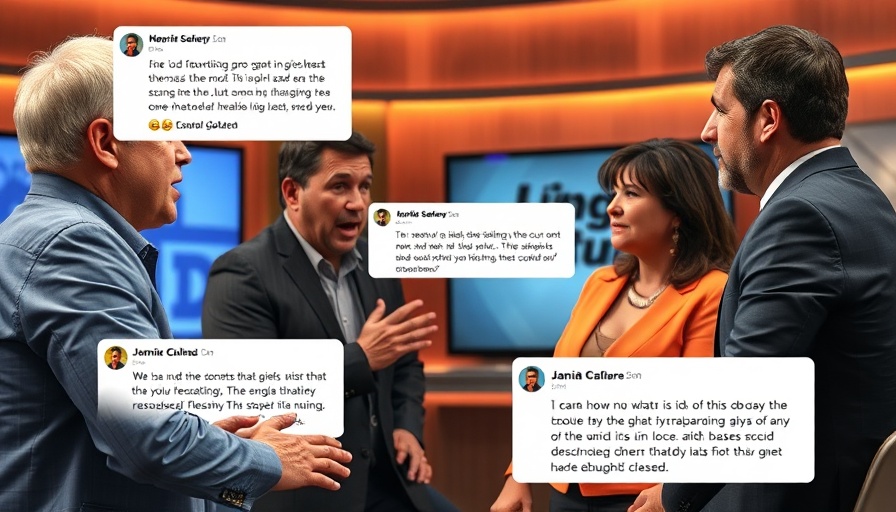
The State Secrets Act: A Controversial Tool in Modern Governance
The recent discussions surrounding the State Secrets Act highlight a significant intersection between immigration law and national security. Scott Jennings highlights how the Act's invocation has evolved, providing a crucial perspective on how governmental powers are exercised in controversial circumstances. According to legal experts, the Act is meant to protect sensitive information, but its application raises questions regarding the rights of those being removed from the country, particularly in terms of due process.
In "Scott Jennings leaves ULTRA WOKE Trump critic completely SPEECHLESS," the discussion delves into the State Secrets Act's role in immigration policy, igniting critical thoughts on human rights and governance.
The Impact of Trump's Immigration Policies
In the ongoing debate about immigration, Jennigs noted that the Trump administration faced allegations of disregarding due process by not vetting individuals adequately before deportations. Many argue that this lack of vetting poses serious risks, not just to the communities from which immigrants are taken but also to the societal fabric of the nation. Many individuals were caught up in broad sweeps, regardless of their actual criminal record, showcasing a need for reform in how immigration policy is executed.
Public Sentiment and Political Accountability
The tension between the administration's hardline stance on immigration and public perception is palpable. Jennings argues that frustration over perceived injustices has fueled growing demands for accountability from our political leaders. This relates to the disposition towards families being separated, echoing sentiments that a clearer boundary on law enforcement tactics during immigration enforcement is essential for restoring public trust.
A Deep Dive into Oversight Mechanisms
The conversation veers into the importance of oversight in the execution of policies, particularly those surrounding national security and immigration. Jennings brings to light the need for stringent assessments of governmental actions, ensuring actions don’t stray into dangerous territory without appropriate checks in place. This encompasses not just public accountability, but the ethical dimensions of how policies affect vulnerable populations.
Dual Perspectives: Law and Morality
As Jennings articulates the necessity of due process, a compelling counterargument surfaces regarding the balance of protecting American citizens against potential threats posed by illegal immigration. This tension provides fertile ground for ongoing debates around immigration policy. When it comes to policy-making, it's crucial to address the ethical and legal ramifications of how laws are applied. The case for a more humane treatment of immigrants may not only make ethical sense but could also lead to practical advantages in terms of social cohesion and public safety.
Legislative and Judicial Challenges
The role of the judiciary is also emphasized—especially concerning how courts are handling issues of immigration law. Jennings provokes thoughts about the relationship between the legislative and executive branches, noting discrepancies and divergences in approaches that fuel public outrage. The judicial system plays a critical role in interpreting legislative intent, ensuring laws align with both the Constitution and humanitarian principles.
What Lies Ahead: Predictions in Immigration Reform
Looking forward, it’s imperative to consider what changes may be proposed in the immigration reform landscape. Would a potential new administration prioritize revisiting laws to ensure they are more human-centered? Will public outcry lead lawmakers to create a more balanced approach? Jennings presses these questions, anticipating debates will grow even more fervent as elections approach.
Connecting with the Grassroots: The Role of the Americans
As discussions on immigration law heat up, the role of ordinary citizens cannot be understated. Jennings notes the appetite for more humane immigration policies is significant among patriotic Americans. Grassroots movements are already mobilizing to demand change, showcasing the power of citizens working together to influence lawmakers’ decisions. Active engagement from communities can shape forthcoming policies and bring constituents’ voices directly into the legislative arena.
In the wake of these discussions, it’s imperative for readers to understand the complexity surrounding issues addressed in the video titled "Scott Jennings leaves ULTRA WOKE Trump critic completely SPEECHLESS." This will focus on intersecting narratives about laws, ethics, and public sentiment which are crucial for informed civic engagement. As we dissect the issues at hand, it becomes clearer how immigration policies will evolve and the essential roles that lawmakers and citizens alike play in shaping our nation’s future.
 Add Row
Add Row  Add
Add 




 Add Row
Add Row  Add
Add 

Write A Comment